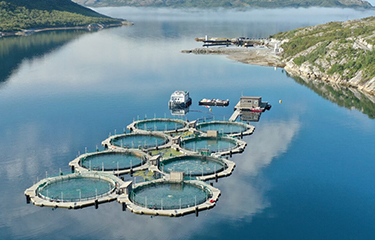A Norwegian salmon farming company that specializes in closed-containment, in-water salmon farms is planning to bring the technology to British Columbia, Canada.
Salhus, Norway-based Akvafuture uses closed cages resembling traditional in-water aquaculture net-pens. In addition, the structures have solid barriers separating the fish the surrounding ocean water, and the company circulates water extracted from deeper areas through the closed cages while containing any waste products and minimizing salmon escapes.
The company produces “EcoSalmon,” a trademark for the salmon it farms in its closed-containment system.
Now, the company is planning to bring the concept to B.C., Business Intelligence for B.C. (BIV) reported.
According to the publication, Akvafuture Managing Director for Canada Dean Trethewey – who formerly worked for Grieg Seafood in B.C. – is heading the company’s push into the region, which it plans to do via a partnership with a B.C. First Nation.
“We have some First Nation partners that want to go forward and now, because of their blessing, we can put the tenure application in,” Trethewey said.
The company has been using the systems in Norway to some success, and Trethewey told BIV one farm can produce roughly 4,000 metric tons (MT) of salmon every 16 to 18 months, at a survival rate of roughly 90 percent. A farm, which costs roughly CAD 20 million (USD 15.1 million, EUR 13.7 million), is more costly than a traditional net-pen but cheaper than the equivalent land-based recirculating aquaculture system (RAS) would in terms of annual production. He said Akvafuture wants to build three or four of the farms in B.C.
The new form of salmon farming could be a means for companies to continue operating salmon farms in B.C., as Canada’s Department of Fisheries and Oceans considers a potential ban on traditional net-pens in the province. Canada’s Liberal Party, which currently controls the country’s government, released a party plan in 2019 calling for a shift away from net-pen farming, and the last two ministers of fisheries, oceans, and the Canadian Coast Guard have followed that mandate in denying license renewals and closing salmon farms.
Canadian Prime Minister Justin Trudeau recently appointed a new minister overseeing the DFO, but the party’s original mandate still stands.
Photo courtesy of Akvafuture







